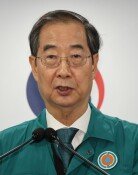Dismissal is not enough for corrupted prosecutor
Dismissal is not enough for corrupted prosecutor
Posted August. 09, 2014 06:26,
The prosecution decided to take internal disciplinary action against a senior prosecutor suspected of receiving bribery of 18 million won from a rich businessman surnamed Song, a Seoul Gangseo District resident who is believed to be murdered in March. While admitting that the senior prosecutor, whose identity is withheld, received money from the murder victim, the top prosecution office said, It would be hard to bring criminal charges against the prosecutor since evidence is lack to prove that he received the bribery in return for request or favor. According to the investigation results, Prosecutor General Kim Jin-tae asked the Ministry of Justice to dismiss the senior prosecutor as a disciplinary action based on the Prosecutors Ethic Principles.
Seoul Southern District Prosecutors` Office, which initially investigated this case, consistently tried to reduce the criminal investigation and announced the bribery amounted to only 2 million won. After criticism was evoked by the fact that a "bribery list" of the business man kept by the police showed the senior prosecutor received 18 million won, Prosecutor General Kim last month ordered the top prosecution office to investigate the case. The prosecution did not bring a prosecution against the senior prosecutor based on the judgment that facts found by the investigation were not enough to sustain a public prosecution in the trial. Again, the prosecution office did not carry out all-out investigation it only made "phone calls" to verify whether the senior prosecutor on suspicion of bribery exercised influence to other prosecutors who investigated the murder case of Song. If another high-ranking public officer received this amount of money in such a case that attracts social attention, discipline would not end up with just dismissal.
The prosecution or the court, which is the highest inspection agency and the final organization that decides criminal punishment, shall have strict standards to its own wrongdoings. That is how the two organizations earn authority in their behaviors. While the prosecution turns a blind eye to corruption of its members, the public loses trust in the jurisdiction and the root of constitutionalism is shaken. The so-called Kim Young-ran Act seeks to give a criminal penalty to a public officer regardless of the reciprocity, when he or she receives bribery or treats worth more than 1 million won. The prosecutions lame excuse that the senior prosecutor was not prosecuted due to lack of evidence for reciprocity reminds us of the urgency to pass the Kim Young-ran Act in the National Assembly.







